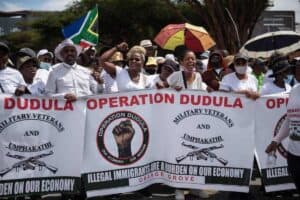The Nigerian government has sent an envoy to SA while expressing its 'displeasure'.

Social cohesion activist and eNCA crime show anchor Yusuf Abramjee tweeted footage on Tuesday of a group of men apparently helping themselves to a cache of machete weapons to protect themselves against the recent upsurge of xenophobic violence in South Africa.
He said the scene took place in the Turffontein area of Johannesburg.
More precisely, it was at the top of Commissioner Street on the border of Troyeville and Jeppestown.
Allegations on Facebook and Twitter were that the men are Nigerian, though this is not confirmed, and that they were arming themselves to fight back.
Who is fueling the violence and why? Look at this video (as received) and how knives are being taken out of the vehicle: Turrfontein area JHB. pic.twitter.com/E6Dg6pVJdc
— Yusuf Abramjee (@Abramjee) September 3, 2019
There were also reports of Nigerians fighting back elsewhere in Gauteng.
https://www.youtube.com/watch?v=8Isbha-ec-0&feature=youtu.be&fbclid=IwAR0G5t7Er34-kH4zBBuNxJQOJtuoPhtv_lQXJYpxHRWcC0ZtHKPYXfwoDhw
Nigeria’s President Muhammadu Buhari on Tuesday sent an envoy to South Africa following all the looting and xenophobic attacks in Johannesburg.
The Nigerian government alleges that businesses owned by its foreign nationals have been targeted. They said in a tweet that “enough is enough”, while other African governments issued warnings to their citizens about the violence.
Nigeria’s high commission in South Africa said in a statement that the situation was “anarchy”, and called on Nigerians to come forward to report on any attacks on them.
Nigeria expressed “displeasure over the treatment of her citizens”.
President Cyril Ramaphosa on Tuesday condemned a wave of xenophobic violence unfurling in several parts of South Africa.
Attacks on businesses run by “foreign nationals is something totally unacceptable, something that we cannot allow to happen in South Africa,” Ramaphosa said in a video address diffused on Twitter.
“I want it to stop immediately,” said Ramaphosa, adding that there was “no justification” for the violence.
South African authorities have been struggling to contain a nationwide surge of anti-foreigner sentiment that flared up in Johannesburg on Sunday.
Mobs descended on business hubs and townships in various parts of the country, looting dozens of shops and torching trucks driven by foreigners.
Police fired rubber bullets and patrolled parts of Johannesburg on Tuesday after the financial capital was hit by a new wave of anti-foreigner violence.
Rocks, bricks and rubber bullets lay strewn across the empty streets of Alexandra after mobs plundered the township overnight, burning and looting shops in their path.
AFP photographers in Alexandra said police presence remained heavy and officers were still firing rubber bullets to disperse the crowds.
Alexandra township is situated just five kilometres (three miles) from Sandton, the city’s affluent business and shopping district — considered Africa’s richest square mile.
The township was scene to a second night of urban rioting in Johannesburg, where hundreds of people marched through the streets on Monday in an unusually large expression of anti-foreigner sentiment.
More than 90 people were arrested on Monday in connection with the violence and looting of shops in Johannesburg and surrounding areas, the government said.
Such violence breaks out sporadically in South Africa where many locals blame immigrants for high unemployment, particularly in manual labour.
“They burnt everything,” Bangladeshi shopowner Kamrul Hasan, 27, told AFP in Alexandra, adding that his shop gets attacked every three to six months.
“All my money is gone. If the (South African) government pays for my plane ticket, I will go back to Bangladesh,” he said.
‘Overwhelmed by hatred’
South African truckers also started a nationwide strike on Sunday to protest against the employment of foreign drivers.
They staged road blockades and torched foreign-driven vehicles in various parts of the country on Monday.
At least another 20 people were arrested in connection with the truck attacks in the southeastern province of KwaZulu-Natal, bringing the total number up to more than 110, the government said in a statement.
South Africa is a major destination for economic migrants from the southern Africa region, with many moving from neighbouring Lesotho, Mozambique and Zimbabwe in search for work.
Deputy President David Mabuza on Tuesday condemned all acts of violence targeting foreign nationals.
“We are a nation founded on the values of Ubuntu (humanity) as espoused by our founding father, President Nelson Mandela,… we should always resist the temptation of being overwhelmed by hatred,” he said during a meeting with ministers in Cape Town.
The violence has erupted on the eve of the World Economic Forum on Africa in Cape Town, where hundreds of political and business leaders will gather for three days on Wednesday.
David Makhura, the premier of Gauteng, said that while irregular migrants could pose a challenge by pushing drugs and counterfeit goods, rioting was not a solution.
“This issue can be dealt with without resorting to xenophobia,” Makhura told reporters. “There is no country that does not have foreign nationals”.
Opposition parties condemned the violence, placing the blame on the ruling African National Congress.
“South Africans are scared and lack real hope for the future,” said Mmusi Maimane, leader of the Democratic Alliance.
“We are seeing economic and social collapse in action, and the widespread violent protests, looting, destruction of property and general lawlessness.”
For more news your way, download The Citizen’s app for iOS and Android.






